 W
W1945 is an alternate history written by Newt Gingrich and William R. Forstchen in 1995 that described the period immediately after World War II in which the United States had fought only against Japan, which allowed Nazi Germany to force a truce with the Soviet Union, and the two victors confront each other in a cold war, which swiftly turns hot.
 W
WThe Afrika Reich is a 2011 alternate history action thriller novel by Guy Saville. In this world, the point of divergence occurs when the United Kingdom is defeated by Nazi Germany during the Dunkirk campaign in 1940, forcing it to sign a non-aggression pact with Germany. Due to the influence of an active Colonial Policy Office (KPA), the Nazis carve up a new colonial empire in Africa, extending their racial genocide to Black Africans. By 1952, the UK and Germany have divided up much of the continent between themselves. It was reviewed favourably by The Times of London and The Economist. A sequel, The Madagaskar Plan, was published in 2015 and begins shortly after the events of the first book.
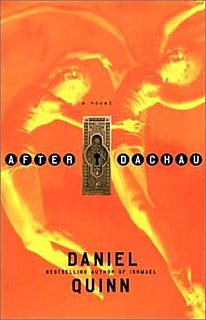 W
WAfter Dachau is a novel written by Daniel Quinn, and published in 2001.
 W
WAgainst the Day is a 1999 historical novel by Michael Cronin. The story is set after the end of World War II in a United Kingdom that has fallen under Nazi occupation. It follows the adventures of two boys who become dangerously involved in a secret resistance movement. A sequel, Through the Night, was published in 2003. A third book in the series, In the Morning, was published in 2005. It was shortlisted for the Angus Book Award.
 W
WAttentatet i Pålsjö skog is a 1996 Swedish alternate history novel by Hans Alfredson. In the book a group of Swedish Communists blow up a German train passing through Sweden, killing several hundred German soldiers and Eva Braun who was on board. Adolf Hitler is infuriated and invades Sweden, which surrenders on May 12, 1941.
 W
WThe Berkut is a 1987 secret history novel by Joseph Heywood in which Adolf Hitler survives World War II. It is set in the period immediately after the fall of The Third Reich. This book pits a German colonel and a Russian soldier from a secret organization against each other. The German, Günter Brumm, has been given orders to safely get the Führer out of Germany with the remaining resources of the Reich at his disposal, while Vasily Petrov, the Russian, has been given orders by Joseph Stalin to capture Hitler with the full resources of the Soviet Union at his disposal. In essence, Hitler says "Get me out of Germany, alive", while Stalin says, "Get me Hitler, alive." The book explores Brumm and Petrov pursuing their goals.
 W
WThe Big Time (1958) is a short science fiction novel by American writer Fritz Leiber. Awarded the Hugo Award during 1958, The Big Time was published originally in two parts in Galaxy Magazine's March and April 1958 issues, illustrated by Virgil Finlay. It was subsequently reprinted in book form several times. The Big Time is a story involving only a few characters, but with a vast, cosmic back story.
 W
WThe Children's War is a 2001 alternate history novel by J.N. Stroyar. It was followed by the sequel A Change of Regime. The book was the long form winner of the Sidewise Award for Alternate History in 2001.
 W
WClash of Eagles is a 1990 alternate history novel by Leo Rutman.
 W
WCollaborator is an alternate history novel by Murray Davies, published as a hardcover on 19 September 2003 and released in paperback in the United Kingdom and the United States in September 2004. The novel is set in a Nazi-occupied Great Britain in 1940 and 1941. It chronicles life during this period primarily through the experiences of Nick Penny, the collaborator of the novel's title.
 W
WColonization: Aftershocks is an alternate history and science fiction novel by Harry Turtledove. It is the third and final novel of the Colonization series and the seventh installment in the extended Worldwar series.
 W
WDominion is a 2012 alternate history novel by British author C. J. Sansom. It is a political thriller set in the early 1950s against the backdrop of a Britain that has become a satellite state of Nazi Germany. The point of divergence from actual history is that Lord Halifax, rather than Winston Churchill, succeeded Neville Chamberlain as Prime Minister in May 1940.
 W
WEndstufe is a 2004 novel by the German writer Thor Kunkel. Set in a hedonistic version of the Third Reich, it follows a biologist who works for the SS where he oversees the secret production of pornographic films.
 W
WFatherland is a 1992 alternative history detective novel by English writer and journalist Robert Harris. Set in a universe in which Nazi Germany won World War II, the story's protagonist is an officer of the Kripo, the criminal police, who is investigating the murder of a Nazi government official who participated at the Wannsee Conference. A plot is thus discovered to eliminate all of those who attended the conference to help improve German relations with the United States.
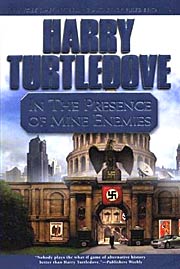 W
WIn the Presence of Mine Enemies is a 2003 alternate history novel by American author Harry Turtledove, expanded from the eponymous short story. The title comes from the fifth verse of the 23rd Psalm. The novel depicts a world in which the United States remained isolationist and so did not participate in the Second World War, thus allowing a victory to the Axis powers, which divided the world among themselves. However, some years after the war, the Third World War occurred and featured the Axis powers defeating the United States and Canada.
 W
WMaking History (1996) is the third novel by Stephen Fry. The plot involves the creation of an alternative historical time line, one where Adolf Hitler never existed. While most of the book is written in standard prose, a couple of chapters are written in the format of a screenplay. The book won the Sidewise Award for Alternate History.
 W
WThe Man in the High Castle is an alternate history novel by American writer Philip K. Dick. Published and set in 1962, the novel takes place fifteen years after a different end to World War II, and depicts intrigues between the victorious Axis Powers—primarily, Imperial Japan and Nazi Germany—as they rule over the former United States, as well as daily life under totalitarian rule.
 W
WThe Plot Against America is a novel by Philip Roth published in 2004. It is an alternative history in which Franklin D. Roosevelt is defeated in the presidential election of 1940 by Charles Lindbergh. The novel follows the fortunes of the Roth family during the Lindbergh presidency, as antisemitism becomes more accepted in American life and Jewish-American families like the Roths are persecuted on various levels. The narrator and central character in the novel is the young Philip, and the care with which his confusion and terror are rendered makes the novel as much about the mysteries of growing up as about American politics. Roth based his novel on the isolationist ideas espoused by Lindbergh in real life as a spokesman for the America First Committee, and on his own experiences growing up in Newark, New Jersey. The novel depicts the Weequahic section of Newark which includes Weequahic High School from which Roth graduated.
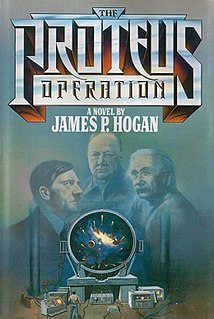 W
WThe Proteus Operation is a science fiction alternate history novel written by James P. Hogan and published in 1985. The plot concerns time travel by one group which brings Adolf Hitler to power, who then wages and wins World War II; and then another group which tries to prevent the Axis victory in World War II
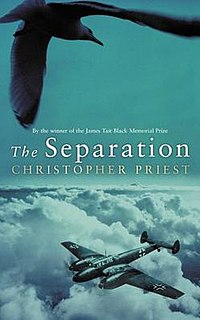 W
WThe Separation is a novel by British writer Christopher Priest, published in 2002. It is an alternate history revolving around the experiences of identical twin brothers during the Second World War, during which one becomes a pilot for the RAF, and the other, a conscientious objector, becomes an ambulance driver for the Red Cross. The author introduces a deliberate confusion by giving these brothers identical initials – J.L. Sawyer – one known as Jack and the other as Joe.
 W
WThe Sound of His Horn is a 1952 dystopian time travel/alternative history novel by the senior British diplomat John William Wall, written under the pseudonym Sarban. The novel has been included in several lists of the greatest fantasy novels of all time.
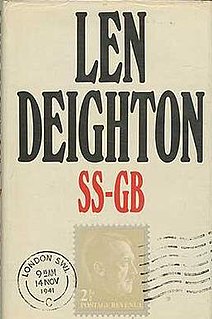 W
WSS-GB is an alternative history novel by Len Deighton, set in a United Kingdom conquered and occupied by Germany during the Second World War. The novel's title refers to the branch of the Nazi SS that controls Britain. It was first published in 1978.
 W
WTimewyrm: Exodus is an original Doctor Who novel, published by Virgin Publishing in their New Adventures range of Doctor Who novels. It is a sequel to author Terrance Dicks' 1969 Second Doctor story The War Games as well as the second part of the ongoing four novel Timewyrm narrative.
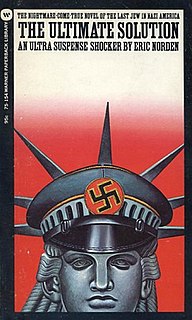 W
WThe Ultimate Solution is a 1973 alternate history novel by journalist and former Playboy interviewer Eric Norden, set in a world where the Axis forces won World War II and partitioned the world between them, and is noted for its particularly grim tone. Norden later wrote the 1977 Adolf Hitler-related science fiction novella The Primal Solution.
 W
WWeaver is an alternate history and science fiction novel by British writer Stephen Baxter. It is the fourth and final novel in his Time's Tapestry quartet, which deals with psionic broadcast of history-altering content within trans-temporal lucid dreams.